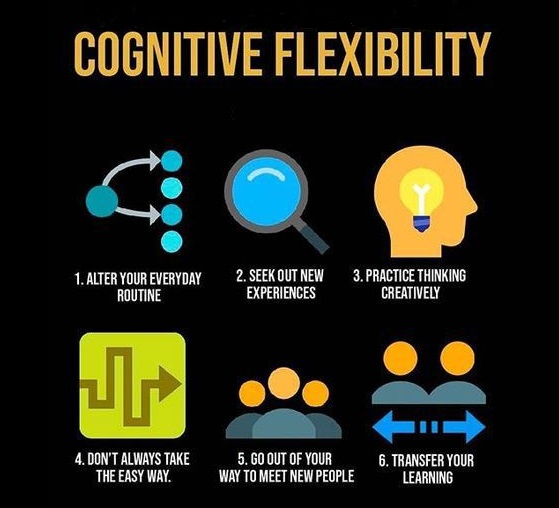Edition: December 5th, 2021
Curated by the Knowledge Team of ICS Career GPS

- Excerpts from article by Barbara Jacquelyn Sahakian, Christelle Langley and Victoria Leong, published on weforum.org
IQ is often hailed as a crucial driver of success, particularly in fields such as science, innovation and technology. In fact, many people have an endless fascination with the IQ scores of famous people. But the truth is that some of the greatest achievements by our species have primarily relied on qualities such as creativity, imagination, curiosity and empathy.
Many of these traits are embedded in ‘cognitive flexibility’ – a skill that enables us to switch between different concepts, or to adapt behaviour to achieve goals in a novel or changing environment.
It is essentially about learning to learn and being able to be flexible about the way you learn. This includes changing strategies for optimal decision-making.
Cognitive flexibility provides us with the ability to see that what we are doing is not leading to success and to make the appropriate changes to achieve it. It may have affected how people coped with the pandemic lockdowns, which produced new challenges around work and schooling. Some of us found it easier than others to adapt our routines to do many activities from home. Such flexible people may also have changed these routines from time to time, trying to find better and more varied ways of going about their day. Others, however, struggled and ultimately became more rigid in their thinking.
Huge advantages
- Flexible thinking is key to creativity – in other words, the ability to think of new ideas, forge novel connections between ideas, and make new inventions.
- It also supports academic and work skills such as problem solving.
- It leads to better cold cognition / non-emotional or rational thinking, throughout one’s lifespan.
- It also guards one against making biased decisions. That’s because people who are cognitively flexible are better at recognising potential faults in themselves and using strategies to overcome these faults.
- Cognitive flexibility is also associated with higher resilience to negative life events, as well as better quality of life in older individuals.
- It can even be beneficial in emotional and social cognition: cognitive flexibility has a strong link to the ability to understand the emotions, thoughts and intentions of others.
The opposite of cognitive flexibility is cognitive rigidity, which is found in a number of mental health disorders including obsessive-compulsive disorder, major depressive disorder and autism spectrum disorder.
Boosting cognitive flexibility
The good news is that it seems you can train cognitive flexibility. It can be boosted by the following 2 methods:
- Cognitive behavioural therapy (CBT) – It is an evidence-based psychological therapy which helps people change their patterns of thoughts and behaviour. In CBT, the goal is to reconstruct their thinking to consider more flexible options, such as the friend being busy or unable to contact them.
- Structure learning – It’s the ability to extract information about the structure of a complex environment and decipher initially incomprehensible streams of sensory information. This learning model suggests that learners should start to develop rules for problem solving. In developing rules, learners need to fill the gaps in the problem and in doing so, learn problem solving.
Studies have shown the benefits of training cognitive flexibility, for example in children with autism. After training cognitive flexibility, the children showed not only improved performance on cognitive tasks, but also improved social interaction and communication. In addition, cognitive flexibility training has been shown to be beneficial for children without autism and in older adults.
As we come out of the pandemic, we will need to ensure that in teaching and training new skills, people also learn to be cognitively flexible in their thinking. This will provide them with greater resilience and wellbeing in the future.
We will need high cognitive flexibility in the present and coming generations to solve big challenges like global warming, preservation of the natural world, clean and sustainable energy and food security.
…
(Disclaimer: The opinions expressed in the article mentioned above are those of the author(s). They do not purport to reflect the opinions or views of ICS Career GPS or its staff.)



